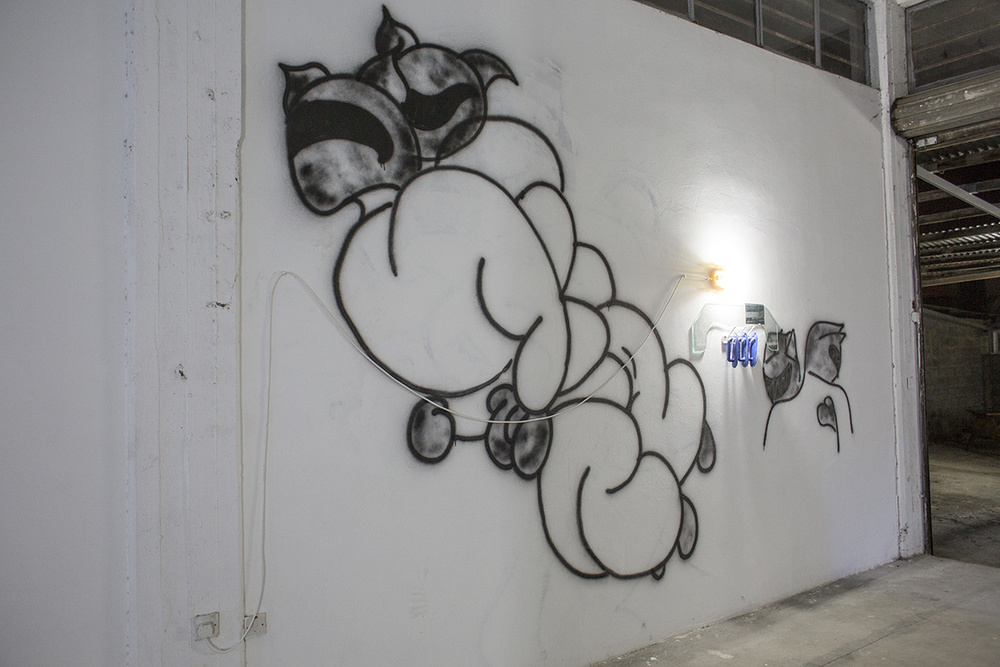Spritzed to Death, On Skin Irony / By Evagoras Vanezis / Nicosia, 05.09.2018
A worker, in the aftermath of a fit of anger, decides to kill a broker of land and bodies who build a high-end brothel on his land. Like an ersatz class consciousness, the worker puts himself in the position of a killer. I think of him as one part super hero (extracting from Hollywood the fascination with vigilante straight men) and one part ‘visitor’ (like the central character in Pasolini’s Teorema, a sexually fluid enigma who exposes the emptiness of bourgeois life). His actions are not only led by desire; he wants to be the embodiment of a desire gone searching for retribution, that sense of justice that is intimately linked to the sense of redistribution.

In this story that makes up only a part of Spritz Palace [1] , the scandal of rent extraction from land and bodies meets the violent act of killing. Both worker and developer assume symbolic functions that try to break through the veil of cultural filters that supress and normalise the socially paradoxical injunction of unbounded capitalist expansion in the face of the depletion of subjective and natural resources.
Within this paradox an incremental rise of the coefficient of friction of a slippage that cannot be refed to normative practices leads to violence. The scandal of this slippage reveals the boiling point of intersubjective alienation, that is, the point at which a generalised dissolution of the enterprise of a society of equals can occur.

The recognition of this slippage as a scandal presupposes the affirmation of a transgression of moral boundaries by a group of people (whether existing or projected). This affirmation allows us to experience social pathologies as strange, as being outside of us, as speaking from a beyond.
That the resolution of scandals is always disproportional to their size and that they very rarely lead to practices for equality is of course accepted. The heralded failure of the neoliberal paradigm to induce equality and exponential freedom (a process which would have guaranteed its seemingly neutral position of enunciation) has led to the remodeling of the ‘grey zones’ [spaces not within the grasp of hegemonic forces], into spaces where freedom is exercised as the rehearsal of a certain belatedness.

In these spaces, any subject expects the in advance capture of his acts and their inclusion in processes antithetical to its intentions. ‘I do not show up on time where you expect to find me – this is my crime- and nonetheless you act as if I already arrived –this is your crime’. This rehearsal –so easily misrecognized as subversive performativity- nonetheless has one important function: it allows us to temporalize the creation of cultural skin.

The slogan of the newest campaign of the Swiss company Swatch is ‘Skin Irony’. It promotes watches through images of faces harmoniously constructed by skin and metal. These faces are connected via IV to the capitalist body, a body wounded by the depletion of subjective forces. Swatch –a watch company- has found a way to uphold the promise of out-of-jointness: the campaign appears to belong in a previous decade whilst trying to speak of the future. This alliance between out-of-jointness and freedom-as-the-rehearsal-of-belatedness defines the present conditions of socialisation via commercialised images: the present is the present is the present.
The flattening of time goes hand in hand with a sense of culture as the embrace of external coating and its rejection as an internally collective organ. The basic impulse of this flattening is the fear of a completely digital world in which touch has stopped defining the border between self and other and masks the obsessive fear of harassment.

Spritz, the coating which leads to the death of the broker, acts as the name of the texture of a necessarily violent and imposed border. The aesthetically globalised phenomenon that translates this texture into a practice is the setting up of ugliness as the paradigm of behavioural recognition.
The fashion industry along with the industry of social media encourages us to identify the new as the detached recognition of the depletion of subjective sources. The ‘ugly aesthetic’, the generalised aesthetic of our times, and the recognition of the creative archive as a holder of free floating visual signs divorced from material conditions of production has led to the return of a repressed imaginary in tune with the endless temporality of the industrious fashion.
This return of glamour in the form of free floating anxiety re-mobilises the double bind of ‘life and representation’ and the binds of identity and materiality. The prophets of this newness control big fashion houses and their main task is to empower deconstruction as a fantasy through which they can sell luxury handbags.
The effort to reclaim the dignity of our sartorial-identificatory references has constructed the preface to a novel in which the culprit is magically known and yet unfathomable.
This narrativity of texture is an effort to uphold a relational compassion.

[1] The essay was written in response to the exhibition ‘Spritz Palace’ at Thkio Ppalies Project Space, https://thkioppalies.org/Spritz-Palace-Stefanos-Chrysanthou-Kyriacos-Kyriakides-Aris